A brief history of Olympic dissent: London 2012
In Beijing today, at the closing ceremony of the Olympic Games, the Olympic Flag will be handed over to London, marking the official moment that London becomes the host of the 2012 Games. It also marks the hand-over of all of the politics, protest and dissent that usually accompanies an Olympic Games.
Over the last 3 weeks I've been examining that history, from the modern founding of the Games in 1896, through the Nazi Olympics of 1936, the protest-laden Games in Mexico in 1968, the terrorist attacks of 1972 and 1996, and the Cold War boycott years of 1980 and 1984. This year's event in Beijing has been marked by terrorism in Xinjiang and protests over the status of Tibet and the fate of Darfur.
Today I wanted to finish this series by looking at the political protests that have already taken place about London hosting the Games in 2012.
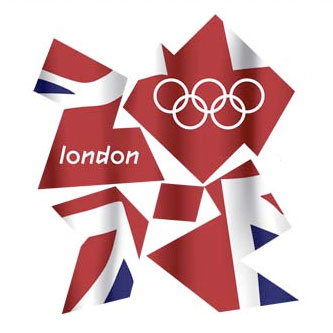
Protesting the bid
Protests against the London Games started when the whole thing was just a twinkle in the IOC's eye. People were encouraged to register their opposition via several websites, many of which have now disappeared into the ether.
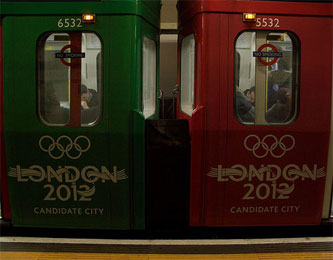
Businesses against the Games
The Games had barely been awarded to London, when local businesses affected by the redevelopment plans were forced to protest. 308 companies in Stratford were closed or re-located in order to allow the infrastructure for the London Games to be built. In September 2005 they were outraged that the London Development Agency was not paying in full the legal and professional fees that the businesses had incurred, purely because they happened to be in the way of the planned 2012 Games.
Olympic Tax
The cost of the Olympic Games already seems to have spiralled out of control. The initial sums appear to have been worked out on the back of an envelope, and many people in London fear that, like Montreal in 1976, the true legacy of the Games will be a mountain of debt.
A group of pensioners in Bexley, South London, took direct action and withheld a proportion of their local council tax, insisting that the whole country should be contributing to the bill, not just London residents.
I always find Wat Tyler's "Burning our money" blog to be a good read, and his take on the Olympics has been inspired. From initial utter dispair at the fact that the Games were coming to the UK, recently he has come up with a fantastic idea. Inspired by the fake elements of the Chinese opening ceremony, Wat now believes the UK could save most of the budget for the Olympics by staging them on an existing council sports ground in Kettering, and having the BBC insert the stadium and the crowds with CGI.
London Olympic living wage
The financial implications of hosting the 2012 Games have also been a campaign focus for the London Citizens' alliance. Part of the promise from the Olympic Delivery Authority is that local East Londoners will benefit from skills and jobs as a result of hosting the Games. The London Citizens' alliance has asked for the ODA to guarantee a 'living wage' of a minimum of £7.05 per hour.
Although the ODA has agreed this in principle, in practice they say that they cannot over-ride national pay agreements between construction contractors and the unions. The London Citizens' group consider this to be back-tracking on the agreement, and letting down the people of London.
Hating the logo
If there were an Olympic Medal for moaning about design decisions, then Great Britain would be in with a great shout. The unveiling of the 2012 Olympic logo was greeted with derision in the UK - and a petition to have it scrapped picked up 50,000 votes in a couple of days.
The Telegraph stalked the people behind the design. The Sun managed to insult designers, monkeys and the blind in one fell swoop with their contest to design a better logo.

As you'd expect, a couple of years down the track the logo looks increasingly familiar and at home within the Olympic family of logos, and the number of variations on display show the versatility of it compared to previous static designs.
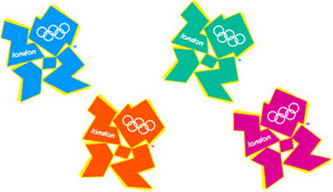


Personally, of course, in the interests of keeping the budget down, I'd have stuck with the original Thames ribbon bid design...
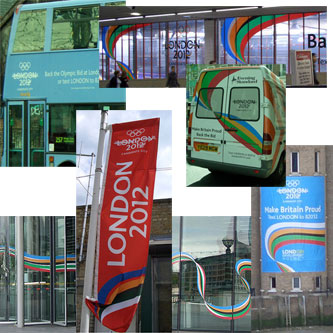
Protests to save the environmental heritage of East London
Protests against the redevelopment of East London are still ongoing - although mostly proving to be fruitless. This campaign video dates from early 2007, and aimed to protect an area called Marsh Lane Fields near my hometown of Walthamstow.
And finally...
Whatever 2012 brings, I'm certain that the 'Free Tibet' protesters who disrupted the London leg of this year's Olympic Torch Relay will not be the last Olympic protest on the streets of London.
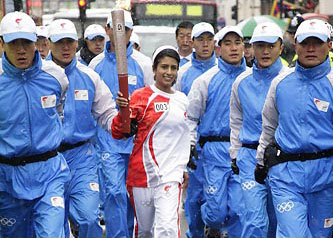
That marks the end of my series of posts about the Olympics - tomorrow normal service will be resumed as I start a review of The Telegraph's new web design.
This Olympic series turned out to be rather lengthier than I first intended, in part because in the build-up to the Games I found myself in Macau, and absolutely surrounded by preparations. For the most part, though, it expanded because I found it such a fascinating topic. The more I researched, the more interested I was in the way that the Games developed from such an inauspicious start with the flawed 1900 and 1904 editions, to become the global event that they are today. It seems that as the Olympics have become a bigger event in the eyes of the media, the more they have become a magnet for politics, protest and dissent.
I hope you've enjoyed the series anyway. You can now download the entire set of articles in one print-friendly PDF document.
![]() Download 'A brief history of Olympic dissent' PDF version
Download 'A brief history of Olympic dissent' PDF version
And finally, a big thank you to my wife, who has yet again repeatedly proof-read a lengthy series of posts with the patience of a saint.
There will be more controversy when the Games get closer and cricketers and the rest of the British people fully realize cricket is excluded. Think it will be easy for the cricket athletes to watch their Olympic counterparts get all the attention and glory?
By then too India will be flexing its new muscle on behalf of its passion,cricket.
Cricket2012Games.com's dream of cricket in
the 2012 Olympics is not just a dream.
be demanding cricket be included
Can I add a political protest you've missed? The Celia Hammond Trust was working to rescue the feral cats living on the the site of the Olympic Stadium, and were told by the ODA that there was a cut-off date, after which the animals would either have to look after themselves or be crushed to death by the demolition. A quick bit of activism, petitioning and use of Facebook later, and the ODA realised that slaughtering kittens might not be the best way to win over the public.
The history of the campaign to save Manor Garden Allotments from the Olympics, and the extensive interest it gave rise to nationally and across the globe, is documented at lifeisland.org.
I think it's fair to say this campaign acquired the highest profile of any relating to 2012 has spawned 100s of press articles, numerous films and documentaries, and contributed to several PhDs!
The critique of the London 2012 preparations and the Olympics in general continues at gamesmonitor.org.uk
You can also follow criticism of the London 2012 Olympics at gamesmonitor.org
The last thing the UK needs right now is another mega expense. I doubt the revenue from the games will out weigh the cost of construction, advertisements etc. The most responsible thing to do, would be to pass on the opportunity and be realistic. It will be the tax payers who feel the effect of this.
I think one needs to distinguish between two types of Olympic protest. There's the protest that relates to the Olympics - folks saying it costs too much, or is not being done the right way, or doesn't include cricket. And then there's the people who are looking to ride on the publicity the Olympics get in order to promote an entirely unrelated cause. And in between, there are protests that are not related to the Olympics, but are topical because of where the Olympics is being staged - protests about Tibet at the Beijing Olympics being a good eample.
Another thing that will be remembered is how much of the introduction for the Beijing games was fake. Fake fireworks, fake singing girls and protester traps set by the government to weed out "unruly" folk.
I agree that the UK could really do without the massive debt that's going to be incurred. This is going to be held at the end of a financial crisis (according to analysts), which is just going to slow our recovery.
I think you are being to harsh on their presentation of the games, every show has made use of computer generated effects. I think the human rights issues should be treated as separate, although this probably didn't help their image much.